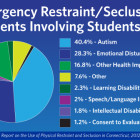Environmental Health
Drowning Can Be Averted, But State Water Safety Funds Have Shrunk
|
Trying to walk out to Charles Island at Silver Sands State Park in Milford this summer, George Swaby drowned after he and a friend were swept up in a fast current off a sandbar. Beachgoers watched as a boater rescued his friend that Friday, July 21. The body of Swaby, 28, was not found for two days. Compounding the tragedy was that it happened in sight of the beach, although outside the swimming area. “It was our goal to guard that beach from Thursday through Sunday,” said Dennis Schain, spokesman for the state Department of Energy and Environmental Protection.
